Introduction
In the competitive landscape of family law, standing out online is no longer optional; it is essential. As potential clients increasingly turn to search engines for legal assistance, family law firms must prioritize Search Engine Optimization (SEO) to enhance their visibility and attract new clients.
This article delves into the foundational elements of SEO tailored specifically for family law practices, exploring key strategies such as:
- Keyword research
- Content creation
- Local SEO
By understanding and implementing these strategies, firms can improve their online presence, engage effectively with clients, and ultimately drive business growth. Furthermore, the article highlights common pitfalls that can hinder SEO success, ensuring that legal professionals are well-equipped to navigate the digital landscape effectively.
Understanding SEO: A Foundation for Family Law Firms
Search Engine Optimization (SEO) for family law is the process of improving a website’s visibility on engines such as Google, which is especially significant for family law practices. Potential clients often depend on engines to seek legal assistance, making it essential for these firms to understand and implement effective SEO strategies. SEO includes a range of methods designed to enhance a website’s position in results, ultimately resulting in greater site traffic and a higher chance of client acquisition.
For instance, one legal client experienced a remarkable 2000% growth in their keywords, demonstrating the potential effectiveness of a well-executed SEO strategy. Key elements of SEO for family law practices include:
- Optimizing website content
- Enhancing site architecture for better navigation
- Building authoritative backlinks
A case study on ‘Technical SEO for Law Firms’ illustrates that factors such as website user-friendliness, SSL certification, and page load speed directly influence rankings; improving these technical aspects can enhance user experience and positively impact SEO performance.
Given the competitive nature of the family law sector, effective SEO for family law can significantly distinguish a practice from its competitors. As highlighted by Google,
Our systems give even more weight to content that aligns with strong E-E-A-T for topics that could significantly impact the health, financial stability, or safety of people, or the welfare or well-being of society.
It’s important to note that SEO results typically take 3-6 months to materialize, which sets realistic expectations for clinic owners regarding the timeline for seeing results from their SEO efforts.
Thus, mastering these strategies is not merely beneficial but indispensable for attracting new clients in the legal field.
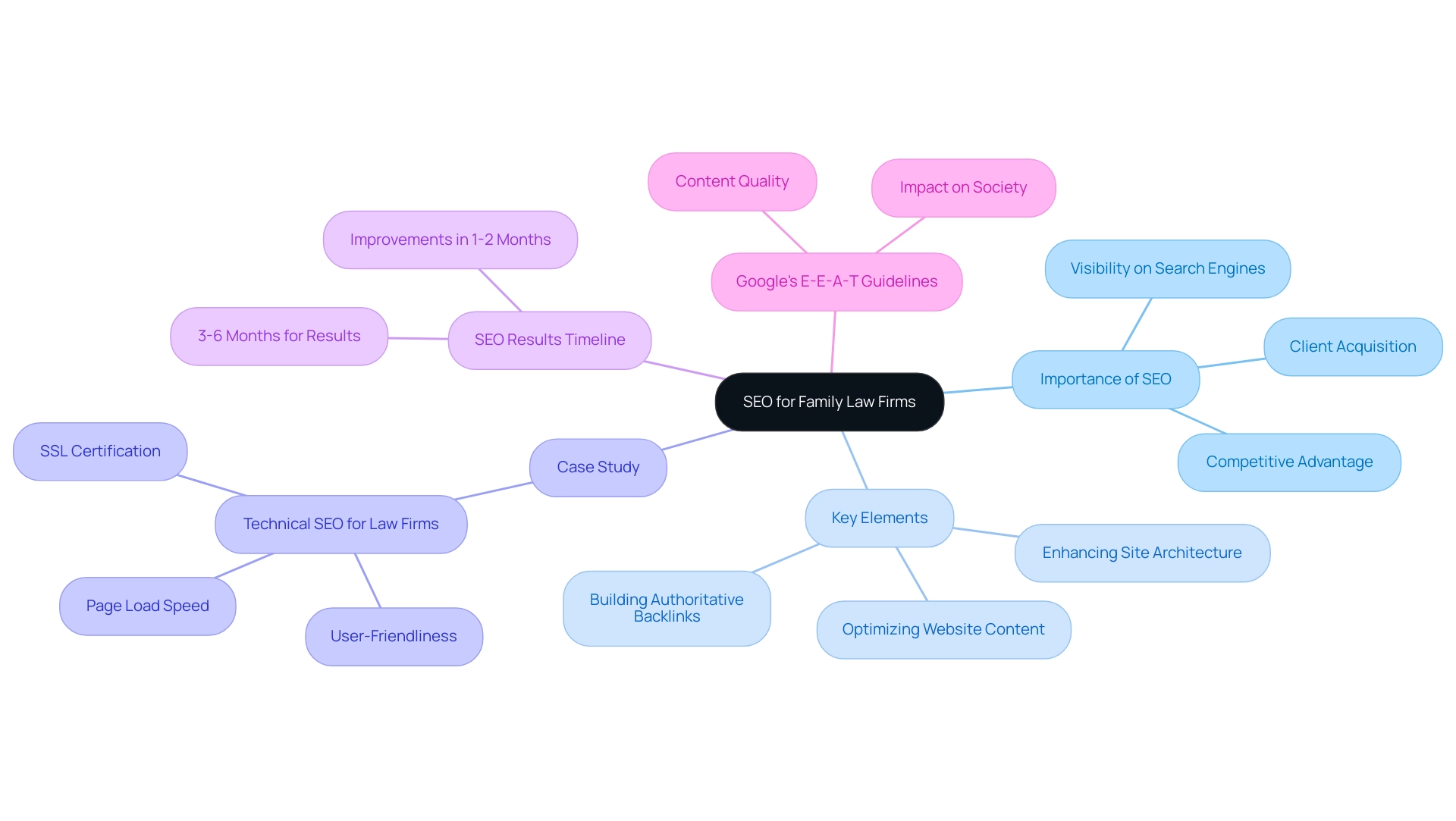
Key SEO Strategies for Family Law Practices
To effectively enhance SEO, family law practices should concentrate on several pivotal strategies:
-
Keyword Research: Identifying relevant keywords that potential clients use to search for family law services is fundamental. Utilizing tools such as Google Keyword Planner can aid in uncovering pertinent terms, including ‘divorce attorney’ and ‘child custody lawyer.’ Recent data underscores the significance of this approach, as effective keyword research is crucial for seo for family law and can substantially enhance a law practice’s online visibility.
-
Implementing SEO for family law involves generating high-quality, informative content that addresses prevalent legal inquiries, establishing a firm as a trusted authority in the field. Creating blog posts, FAQs, and detailed guides on family law subjects can improve rankings and engage potential clients effectively.
-
On-Page Optimization: This involves ensuring each webpage is meticulously optimized for engines. Key practices include incorporating keywords into titles, headings, and meta descriptions, optimizing images, and maintaining fast load times. Such measures are crucial for enhancing user experience and engine performance.
-
Local SEO for family law practices is essential for targeting local clientele. This can be achieved by enhancing Google My Business listings, acquiring local backlinks, and ensuring visibility in local results. Significantly, 42% of consumers read online reviews before interacting with local businesses, emphasizing the necessity for legal practices to foster favorable client feedback. As noted by BrightLocal, “42% of consumers regularly read online reviews before engaging with local businesses,” which underscores the importance of managing online reputation for seo for family law to build trust and visibility. Moreover, a case study named “Reviews Influence Local SEO” demonstrates that motivating pleased clients to provide feedback can greatly enhance a law practice’s local rankings.
-
Backlink Building: Securing links from trustworthy sites can greatly improve a company’s credibility and engine rankings. Engaging with local organizations or contributing articles to legal publications can serve as effective strategies for building valuable backlinks.
By implementing these strategies, family law practices can utilize seo for family law to improve their online presence, attract a greater number of clients, and ultimately foster business growth.
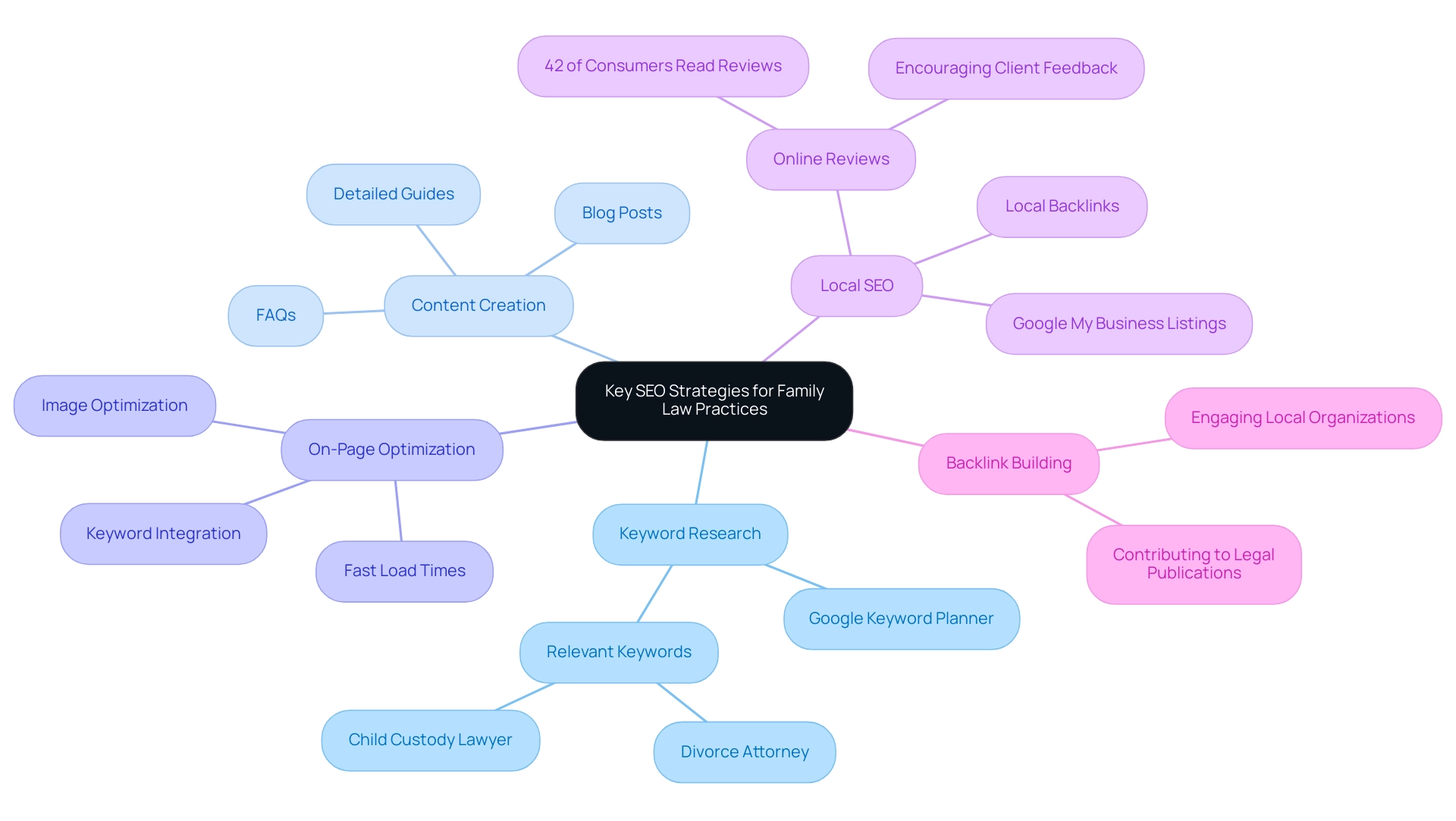
The Importance of Local SEO for Family Law Firms
Local SEO for family law holds considerable significance for family law firms, primarily due to the localized nature of client inquiries for legal services. Most potential clients tend to look for legal assistance within their immediate vicinity, often utilizing queries like ‘family lawyer near me’ or ‘divorce attorney in [City].’ In fact, studies indicate that 76% of individuals who look for something nearby visit a business within a day, highlighting the urgency of local inquiries.
To improve their visibility in these crucial results, legal practices must adopt several key strategies. Among the most effective tactics is:
- Claiming and optimizing Google My Business listings, which plays a pivotal role in shaping local search outcomes. As one expert noted, “There are some deeply entrenched competitors for personal injury in Chicago, but to go from #180 on a list of 200+ competitors to the top 10 in a short time has been nothing less than remarkable!”
This quote emphasizes the competitive environment family law practices encounter. Furthermore, maintaining consistency in NAP (Name, Address, Phone Number) across various online directories is essential to establish trust and ensure reliable representation of the organization’s contact information. Additionally, accumulating positive client reviews significantly contributes to credibility and can influence prospective clients’ decisions.
Continuous optimization and analytics are essential for understanding lead generation from map listings, enabling companies to refine their strategies over time. These concerted efforts not only enhance visibility but also foster trust and credibility among potential clients, underscoring the necessity of SEO for family law as a foundational element of a family law practice’s marketing strategy.
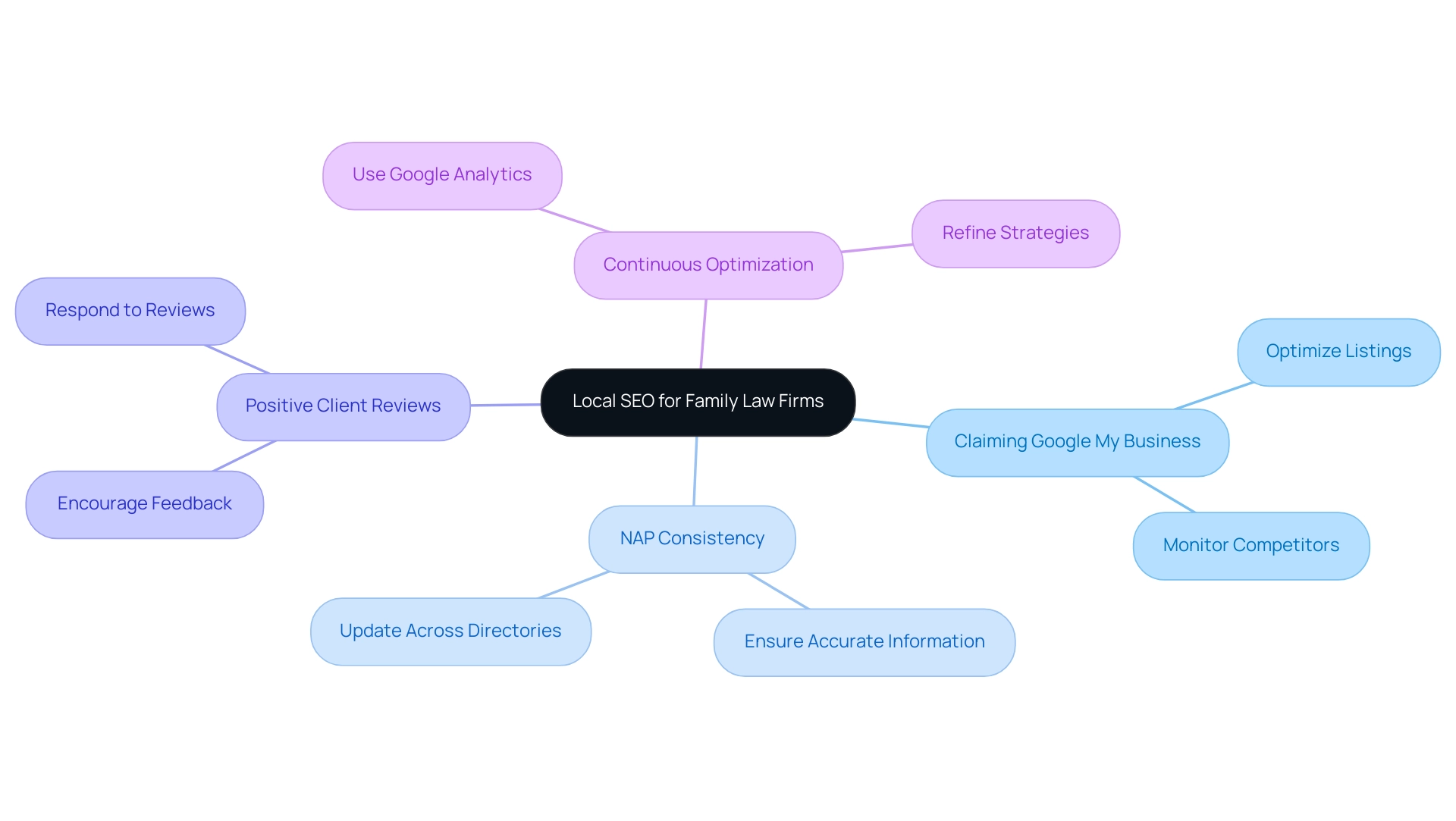
Measuring SEO Success: Key Metrics for Family Law Firms
Assessing the success of SEO for family law practices is essential for understanding their online performance and making necessary adjustments. A well-crafted marketing strategy is crucial for success in the legal profession, and regularly tracking key metrics can provide valuable insights into the effectiveness of SEO strategies. Important metrics to monitor include:
-
Organic Traffic: Examining the number of visitors coming to the website from engines provides crucial insights into the effectiveness of current SEO strategies. For instance, our clients average 178 leads per month, highlighting the potential impact of well-implemented strategies.
-
Keyword Rankings: Evaluating the organization’s rankings for targeted keywords is crucial for assessing the success of optimization efforts.
-
Conversion Rates: The percentage of website visitors who complete desired actions—such as filling out a contact form or scheduling a consultation—is critical for evaluating return on investment (ROI).
-
Bounce Rate: Understanding the percentage of visitors who leave the site after viewing only one page can indicate the relevance and engagement level of the content.
-
Backlinks: Monitoring both the quantity and quality of backlinks helps assess the organization’s authority and credibility in the eyes of search engines, reinforcing the importance of technical SEO, which involves structuring a website according to Google’s guidelines for efficient navigation and indexing.
Matthew Dotson, a freelance writer, notes, > Did you know many of Google’s top-ranking articles have had their titles changed multiple times? < This observation underscores the need for continuous optimization.
A case study worth mentioning is Kaleidico, a legal agency that specializes in enhancing digital marketing and SEO strategies for legal practices. Their expertise has proven effective in assisting businesses attract more leads and convert them into clients. By consistently reviewing these metrics, family law practices can gain critical insights into their SEO for family law performance, allowing them to make informed, data-driven decisions to enhance their online visibility.
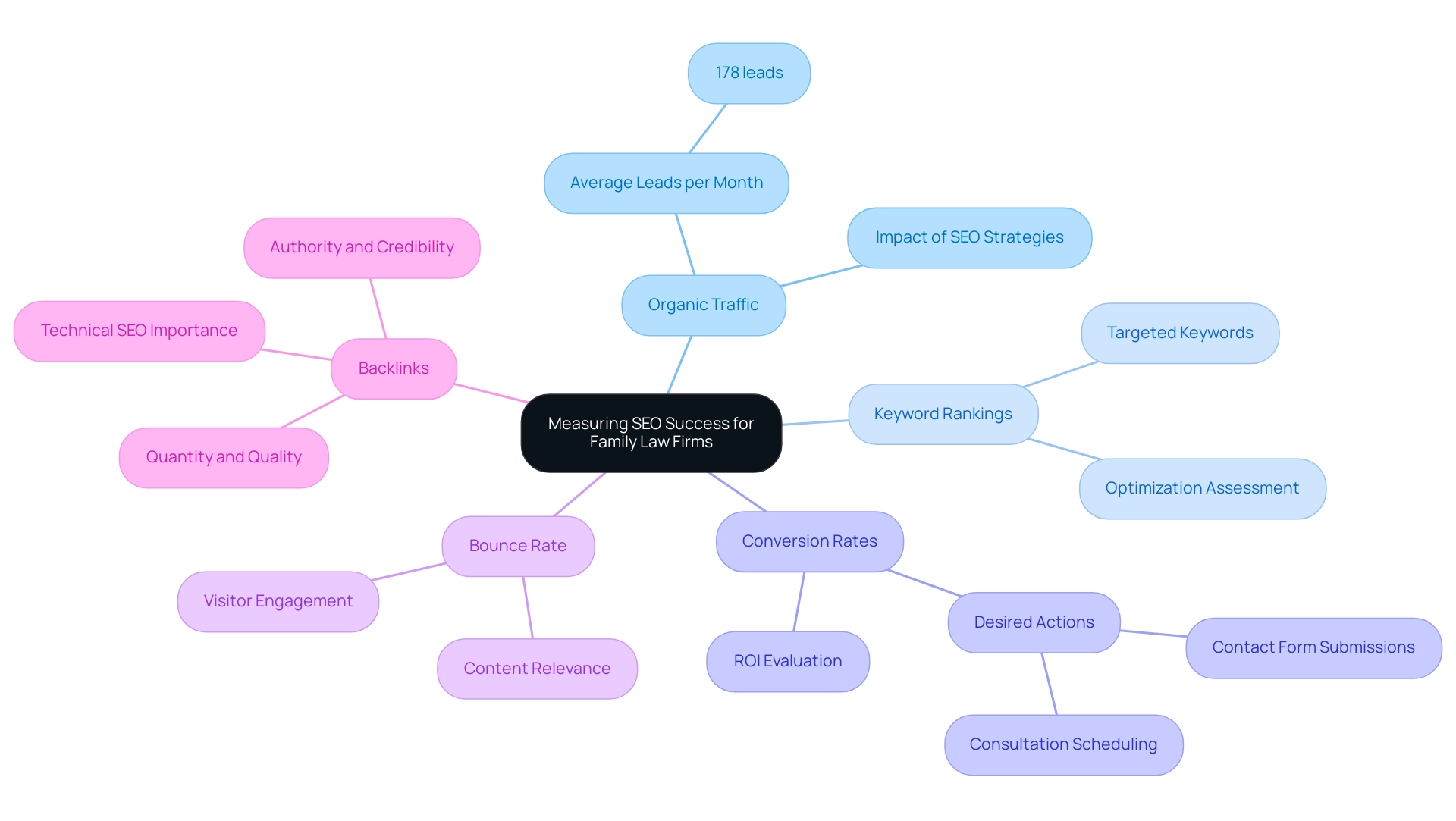
Common SEO Mistakes Family Law Firms Should Avoid
Family law practices must remain vigilant about common pitfalls in SEO for family law that can significantly undermine their online marketing efforts. The following mistakes are particularly detrimental:
-
Neglecting Mobile Optimization: With mobile devices representing a significant part of online inquiries, failure to optimize websites for mobile can result in lost client opportunities.
Statistics indicate that mobile optimization can lead to a 20% increase in website traffic, underscoring its importance. -
Ignoring Local SEO: A lack of focus on local SEO can prevent firms from connecting with potential clients in their immediate geographic area, where the majority of legal services are sought. Implementing local exploration strategies is essential for maximizing visibility.
-
Overstuffing Keywords: While keyword optimization is a critical component of SEO, excessive use of keywords can attract penalties from engines, ultimately harming content quality and rankings. It is vital to strike a balance that maintains readability while effectively targeting relevant terms.
-
Lack of Quality Content: Producing substandard or irrelevant content can harm a company’s reputation, as well as its search rankings.
High-quality, informative content that addresses the needs and concerns of potential clients is essential for establishing authority in the field. -
Failing to Monitor Performance: Not tracking SEO metrics, such as open rates and click-through rates, hinders companies from understanding what strategies are effective and what areas require improvement.
Regularly analyzing these metrics allows for data-driven decisions and continuous refinement of SEO strategies.
As noted in a case study, measuring the success of email marketing campaigns through key metrics is critical for continuous improvement.
Email marketing produces $44 for every $1 invested, emphasizing the efficiency of strategic marketing initiatives that can enhance SEO tactics.
By proactively steering clear of these frequent errors, family law practices can create a more efficient SEO for family law strategy, improving their online visibility and ultimately drawing in a larger number of clients. Joseph A. Scrofano from Scrofano Law PC emphasizes that partnering with an experienced SEO provider, who employs strategies such as local SEO and mobile optimization, can elevate a firm’s visibility in a competitive landscape, underscoring the necessity of strategic SEO for family law efforts.
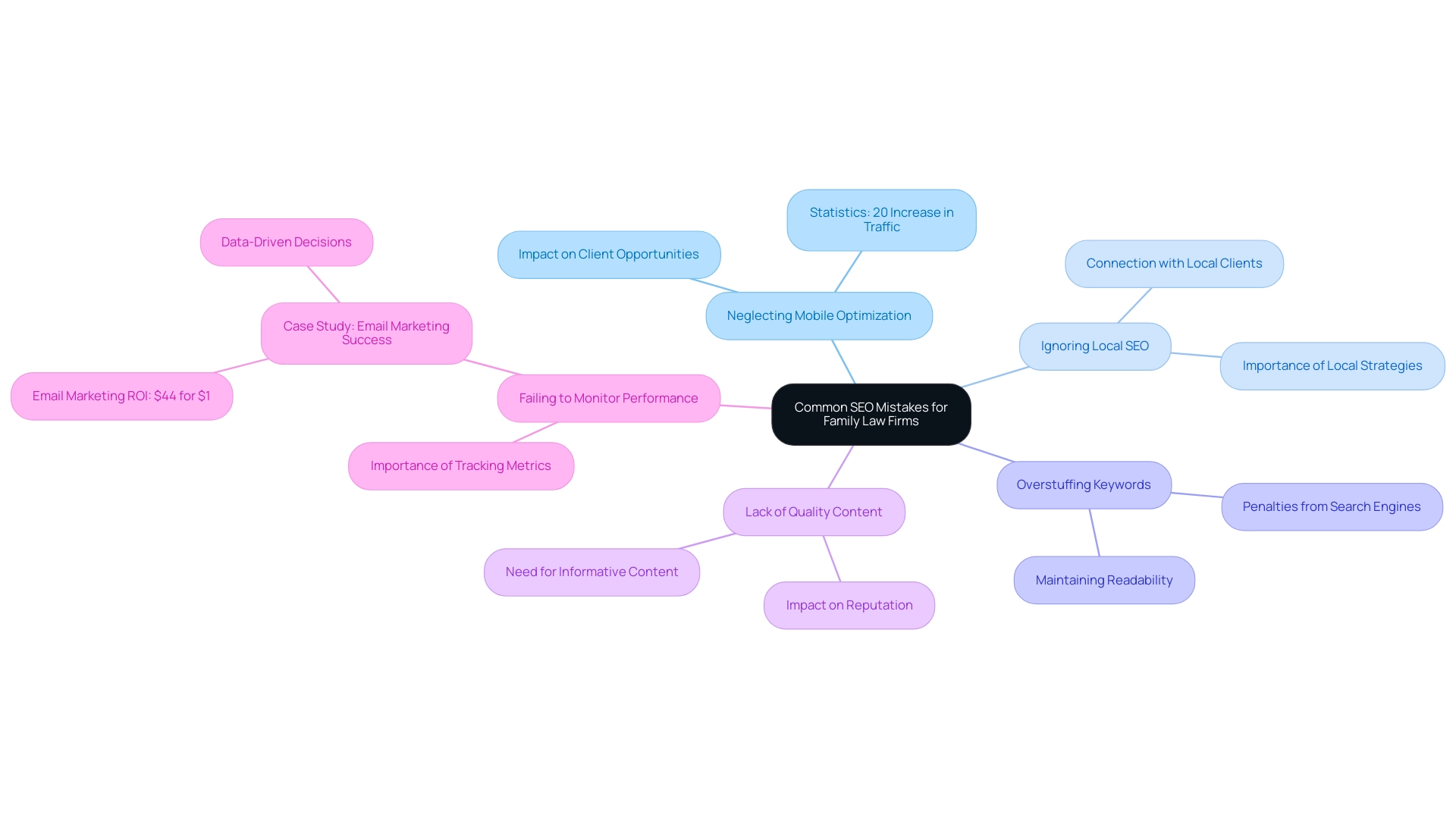
Conclusion
Implementing effective SEO strategies is crucial for family law firms aiming to thrive in a competitive digital landscape. By focusing on key elements such as:
- Keyword research
- Content creation
- Local SEO
- Backlink building
firms can significantly enhance their online visibility and attract potential clients. The importance of local SEO cannot be overstated, as most clients seek legal services within their immediate vicinity. Optimizing Google My Business listings and maintaining a consistent online presence can greatly influence a firm’s ability to connect with local clientele.
Moreover, measuring the success of SEO efforts is essential for continuous improvement. By monitoring metrics such as:
- Organic traffic
- Keyword rankings
- Conversion rates
firms can gain valuable insights into their performance and make informed decisions. Avoiding common pitfalls—like neglecting mobile optimization and failing to produce quality content—can further ensure that SEO initiatives yield positive results.
In conclusion, mastering SEO is not just beneficial but indispensable for family law practices looking to grow their client base and establish a strong online presence. By adopting a strategic approach to SEO, firms can navigate the complexities of the digital landscape and position themselves as trusted authorities in family law, ultimately driving business growth and enhancing client engagement.

